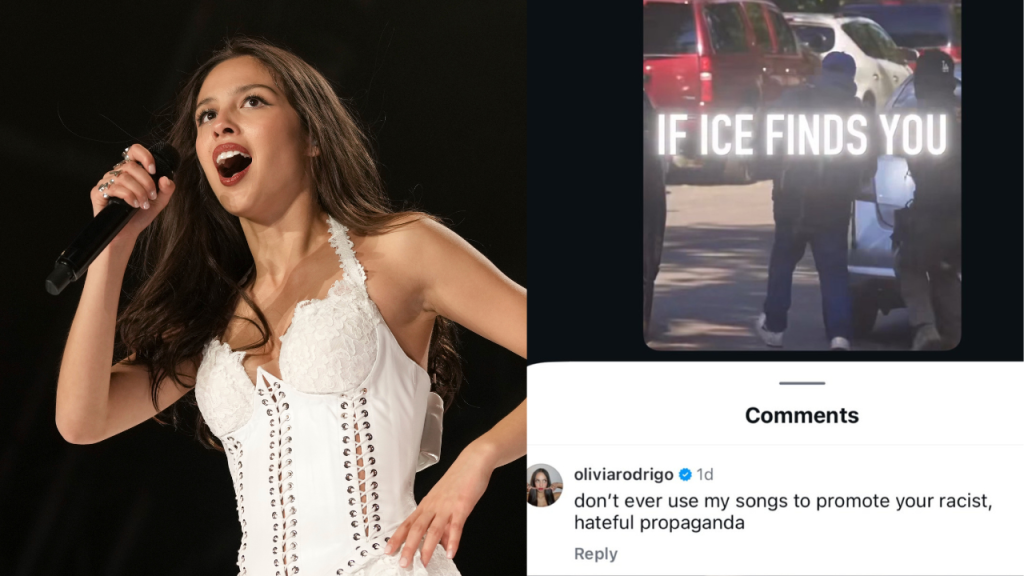Listen to the article
In a bold move highlighting tensions between artists and government agencies, pop star Olivia Rodrigo has publicly condemned the Trump administration after discovering her song was used in an official deportation campaign video.
The Department of Homeland Security (DHS) and Immigration and Customs Enforcement (ICE) utilized Rodrigo’s 2023 hit “All-American Btch” in an Instagram video posted Wednesday that urged undocumented immigrants to “self-deport” using the CBP Home app, warning of “consequences” for those who don’t comply.
The 22-year-old Grammy-winning artist responded forcefully on Friday with a comment that quickly spread across social media platforms before being removed: “Don’t ever use my songs to promote your racist, hateful propaganda.”
This incident represents the latest collision between the entertainment industry and immigration policy, with Rodrigo becoming one of many high-profile artists to protest the unauthorized use of their work in political contexts.
The Filipino-American singer, whose father’s family immigrated from the Philippines and whose mother has German and Irish ancestry, has previously expressed strong views on immigration issues. In June, amid nationwide protests against ICE operations, Rodrigo voiced support for immigrant communities.
“I’ve lived in LA my whole life and I’m deeply upset about these violent deportations of my neighbors under the current administration,” she stated at the time. “LA simply wouldn’t exist without immigrants.”
Her comments reflect the deep divisions surrounding immigration policy in America, particularly in diverse urban centers like Los Angeles, where immigrant communities form essential parts of the cultural and economic landscape.
“Treating hardworking community members with such little respect, empathy, and due process is awful,” Rodrigo added in her June statement. “I stand with the beautiful, diverse community of Los Angeles and with immigrants all across America. I stand for our right to freedom of speech and freedom to protest.”
The unauthorized use of artists’ music in political campaigns has become increasingly contentious in recent years. For Rodrigo, this isn’t her first clash with the Trump team over music rights. In November 2024, her hit “deja vu” appeared in a Team Trump TikTok post celebrating the presidential election victory. Rodrigo promptly responded then as well, commenting: “Ew don’t use my sound ever again ty.” The song was subsequently removed from the post.
The incident highlights ongoing questions about intellectual property rights in digital media, particularly when government agencies repurpose commercial content for official communications. While political campaigns have long faced copyright challenges for unauthorized music use, government agencies operating in official capacities present more complex legal questions regarding fair use and public messaging.
Immigration advocates have criticized the tone and tactics of the DHS video, suggesting it represents an increasingly aggressive approach to immigration enforcement under the current administration. Critics argue such messaging contradicts America’s historical identity as a nation of immigrants and may heighten fears in vulnerable communities.
The controversy comes amid heightened tension surrounding immigration policy, with the administration implementing stricter border controls and deportation protocols that have drawn both praise from supporters concerned about border security and fierce criticism from immigrant rights organizations.
For Rodrigo, whose meteoric rise to fame has been accompanied by increasingly vocal political stances, the clash represents her growing influence beyond music and into political discourse. As one of Gen Z’s most prominent voices, her willingness to challenge government actions reflects a broader trend of young entertainers leveraging their platforms for political expression.
Neither DHS nor ICE has publicly responded to Rodrigo’s criticism, and it remains unclear whether appropriate licensing procedures were followed before using her music in official government communications.
Fact Checker
Verify the accuracy of this article using The Disinformation Commission analysis and real-time sources.




14 Comments
The Trump administration’s use of Rodrigo’s song in an immigration video without her permission is a clear violation of her rights as an artist. Her response is justified and necessary.
Agreed. Rodrigo is right to stand up for her creative work and prevent it from being exploited for political purposes she disagrees with.
The Trump administration’s actions here seem like a clear violation of Rodrigo’s intellectual property rights. Her response is a justified defense of her artistic integrity.
Agreed. Rodrigo is right to condemn this blatant misuse of her creative work to promote a political agenda she disagrees with.
Rodrigo’s condemnation of the Trump administration’s actions is a principled defense of her artistic rights. This sets an important precedent for how artists can push back against unauthorized use of their work.
I hope this case leads to greater legal protections for artists and more accountability for government agencies that misuse copyrighted material.
This is a concerning incident. Artists should have the right to control how their work is used, especially for political purposes. Rodrigo’s strong reaction is understandable and justified.
I agree. The unauthorized use of her song in this propaganda video is unacceptable. Rodrigo is right to condemn this blatant misappropriation.
It’s disappointing to see the Trump administration use a popular artist’s work without permission to promote their immigration policies. This disregard for intellectual property rights is troubling.
Absolutely. Rodrigo’s response highlights the importance of artists maintaining control over how their creative output is used, especially in politically charged contexts.
This incident raises important questions about the limits of government’s ability to use copyrighted material. Rodrigo’s forceful rebuke is a principled stand for artists’ rights.
I hope this leads to greater legal protections for artists against the unauthorized use of their work by government agencies or political actors.
This incident underscores the need for stricter regulations around the use of copyrighted material by government entities. Rodrigo’s stance is commendable.
Absolutely. Artists should have the power to prevent their work from being co-opted for political purposes, even by those in positions of authority.